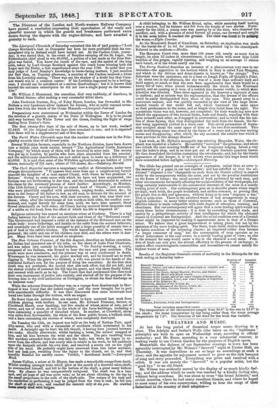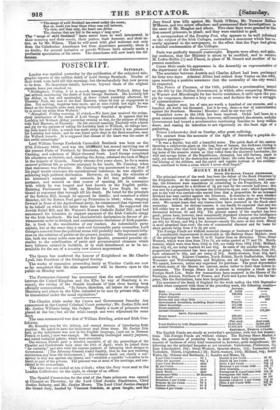THEATRES AND MUSIC.
At last the long period of theatrical torpor seems drawing to a close. The Adelphi and Sadler's Wells (the latter on the " legitimate " principle) are both to open on Wednesday next, according to official authority; and Mr. Bunn, according to a very substantial rumour, is making ready to use Covent Garden for the purposes of English opera.
Meanwhile, the dulness of our September evenings in town has been agreeably interrupted by Mr. Wilson's "farewell " night at Exeter Hall, on Thursday. It was marvellous to see so large an assemblage at such a time; and the appetite for enjoyment seemed to grow as the rich banquet of song and story proceeded. Everything was given and received with a relish. It was not merely the " farewell " to a popular artist, but the " good bye " to an old friend.
Mr. Wilson was evidently moved by the display of so much kindly feel- ing; and the address which he made was marked by a kindly feeling also, without being overdone. He was about to cross "the broad Atlantic," and revisit America, where he had many excellent friends, and where he hoped to meet many of his own countrymen, willing to hear the songs of their I fatherland in the country of their adoption- " The sangs of auld Scotland are sweet midst the scene;
But oh, could you hear them when seas roll between, 'Tis then, and then only, the heart can divine
The charms that are hid in the sangs o' fang syne." The "sings of mild Scotland" have never been so well interpreted, in their meaning and their music, their pathos, their humour, -and their sa- tire, as by Mr. Wilson. That he will meet with glad welcome not only from the Caledonian Americans but from Americans generally, there is no doubt; for several imitative or pseudo Wilsons have already made a profitable speculation of his name. The Americans will now learn the dif- ference.



























 Previous page
Previous page